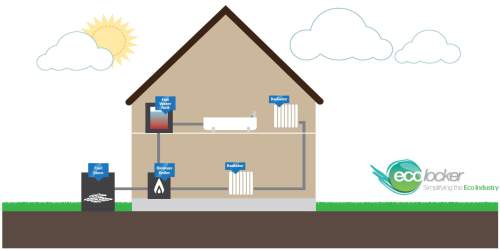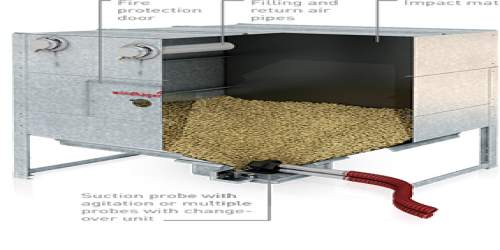Read Time : 5 Minutes
What are the Financial Benefits of Biomass and Pellet boilers
Biomass stoves and boilers can save you money as well as helping to lower your property’s carbon emissions. Although the price of fuel for these stoves and boilers varies considerably, it can be a much cheaper option than most other heating solutions. Wood chips are considered the cheapest form of fuel, estimated at around 2.9p per kWh of heat generated. Wood pellets are around 4.2p per kWh, with natural gas at 4.8kWh, heating oil 6p, LPG at 7.6p and electricity at 14.5p kWh. This said, the price of your biomass fuel can vary dramatically depending on your supplier, however fear not, as after the initial investment there are currently available financial incentives (see below*) that could make heating your home actually end up earning you money! Research commissioned by DECC and published in February 2013 found the following average costs per kW for biomass boilers: 10-20kW - £945; 20-50kW £568 *There are also financial support and incentive systems to consider such as the renewable heat premium paymentand the renewable heat incentive.
Financial savings associated with Bomass Boilers
The amount of savings offered by biomass boilers depend on the property's individual specifications and on the large range of factors identified here, as well as your energy needs. The table below gives you a very rough indication of how much you can expect to save if you install a pellet-fired biomass boiler (see the notes below for information on calculations and assumptions): The following table* shows the estimated average annual savings of a biomass heating system when replacing an existing system. It also shows suggested income values from RHI payments.
*The following fuel costs are assumed: that fuel costs per kW are as follows: Coal - 3.7p; Electricity - 14.4p; Gas - 4.5p; LPG - 8.2p; Oil - 5.9p. **These figures assume a 3 bedroom, semi-detached home with insulation and an efficient pellet-fired biomass boiler. The calculations assume that the property's annual energy demand is 20,000kWh, and that the price of the woodfuel (pellets) is £185/ton. *Information from the Energy Saving Trust Website. It is therefore evident that quite apart from being environmentally-friendly, biomass boilers can quickly pay for themselves and present a sound long term investment.
COMPARE PRICES FROM LOCAL INSTALLERS
Compare prices from local companies fast & free
Enter your postcode to compare quotes from leading professionals. We promise to keep your information Safe & Secure. Privacy Policy
The Green Deal for Biomass
--This Scheme has now been CLOSED by Government --
You can also benefit from the governments Green Deal Scheme. This financial mechanism is designed to help procurers of renewable energy technology improve the energy efficiency of their property by helping with the initial costs. The scheme works by helping with the initial financial outlay and then recouping the funds by taking a percentage of the savings you are making on you energy bills over a 10-25 year period. This scheme will still allow you to benefit from the financial savings of your newly installed technology by only taking an affordable percentage of the savings being made. The length of the payback period is worked out based on your personal systems performance and your annual energy demands. For more information on the green deal or any other schemes mentioned here you can call the Energy Saving Advice Line on 0300 123 1234 or alternatively you can contact us and we will arrange for a Green Deal assessor to contact you to discuss your requirements.
Renewable Heat Premium Payment (RHPP)
----------THIS IS NOW CLOSED AS OF MAY 2015------------
The Renewable Heat Premium Payment (RHPP) is a Department for Energy and Climate Change (DECC) initiative which aims to support those thinking of installing renewable heat technology on their property. The RHPP is a one-off payment (in voucher form) toward the cost of installing a renewable heat source. The current phase (phase 2) of the RHPP is valid for installations installed before March 2014. The Renewable Heat Premium Payments scheme offers a grant of £2000 per property (valid for 6 months) to help with the initial costs of installing your biomass boiler. This payment then gets deducted from the RHI payments over the seven years of the scheme. You can apply for these schemes and find out more about them at the Energy Saving Trust Website. In order to be eligible for the RHPP for biomass boilers, your property must satisfy the following criteria:
- its heating system must not currently be mains gas-powered (i.e. you must not be connected to the grid and you must currently be using oil, solid fuel, liquid gas or electricity)
- it must be owned by you, or if you are a tenant you must purchase the biomass boiler yourself
- it must have 250mm of loft insulation and, where feasible, cavity wall insulation
- you must not have received any payment under RHPP phase 1 (non-domestic)
- the biomass boiler itself must be installed by a Microgeneration Certification Scheme-accredited installer and fitted with an MCS-approved generation meter
- you must have undertaken a Green Deal Assessment before submitting a claim to EST for payment of your voucher
- you should have all necessary planning and environmental permissions in place
If you have any questions or require clarification on specific matters relating to your claim, email: RHPremium@est.org.uk If you require further clarification about this scheme click here.The tariff for the domestic renewable heat incentive (RHI) for biomass boilers and biomass pellet stoves with back boilers will be 12.2p per kWh. This will be paid to you quarterly and in arrears for a period of seven years. You will have to meet the RHI’s air quality and fuel sustainability criteria. This basically means that you will be paid 12.2p per kWh for every unit of heat energy that your system creates.
Important changes – Spring 2016 Regulatory Amendments
On 3 March 2016 the Department of Energy and Climate Change (DECC) announced their intention to make a number of changes to the Renewable Heat Incentive scheme. These changes are planned to come into force on 24 March 2016 and key amendments include, but are not limited to, the following:
- New applicants will not be required to provide a Green Deal Advice Report (GDAR)
- New applicants with self-build properties will be exempt from the 183 days occupancy declaration
- Clarification on Ofgem’s powers to request a new Energy Performance Certificate (EPC) and amend the RHI payments accordingly if needed
- Tariffs will be subject to adjustment by the Consumer Prices Index (CPI) instead of the Retail Prices Index (RPI) (for participants with a tariff start state from 1 April 2016).
- Ensuring consistency in rounding of tariffs
- Aligning the RHI sustainability criteria with that set out in the Renewables Obligation Order 2015.
DECC have also published a consultation to seek feedback on the proposed reforms to the scheme. The renewable heat incentive: a reformed and refocused scheme consultation will close on 27 April 2016. You should keep these changes in mind if you are planning to apply for the domestic RHI scheme or are considering installing an eligible system. This is not an exhaustive list of changes to the scheme and further information can be found in the Renewable Heat Incentive: amendments to scheme eligibility document on DECC’s site. Renewable Heat Incentive (RHI) is another Department for Energy and Climate Change (DECC) initiative which allows those who choose to install renewable heat sources in their property to receive payment per kilowatt hour (kWh) of heat produced. The RHI has two phases:
- Phase 1 - RHI payments for heat produced in non-domestic installations (i.e. those in businesses, industry and the public sector). This phase is currently in effect and is open for applications.
- Phase 2 - payments for heat produced by domestic installations, which the DECC plans to introduce in spring 2014 (though this is unconfirmed).
NB. In the case of businesses, payments received through the RHI counts as taxable income and should be declared as such. The now confirmed (August 2nd 2013) tariff ranges for the domestic RHI are as follows:*
| Domestic RHI | Tariff per kWh |
|---|---|
| Biomass boiler | 12.2p/kWh |
In order to be eligible for RHI tariff payments, the property must satisfy the above conditions. Moreover, the installation must be carried out by a Microgeneration Certification Scheme (MCS) accredited installer, who will also install a generation meter. For more information on non-domestic RHI, see the energy regulator Ofgem’s website. For information about the domestic RHI, see the DECC website. *‘Renewable Heat Incentive: Consultation on proposals for a domestic scheme’, Department for Energy and Climate Change, p. 54. Available here.
Non-Domestic Renewable Heat Incentive
Non-domestic Renew0able Heat incentive opened for applications in November 2011. It covers commercial and community installations, and pays a generation tariff per kWh produced over a 20 year period. It aims to give a 12% return on capital, and is index linked. The heat produced must be measured by a meter and the payments will be paid in arrears. Tariffs for new installations from 1 July 2013 are:
| Boiler size | RHI Rates |
|---|---|
| Small biomass | (Less than 200kWth) Tier 1: 8.6p/kWh, Tier 2: 2.2p/kWh |
| Medium biomass | (200kWth |
| Large biomass | (1MWth +) 1p/kWth |
DECC tariff table for non-domestic RHI: https://www.gov.uk/renewableheatincentive/what-youll-get These biomass tariffs have been tiered to remove any incentive to generate excess heat to receive larger payment sums. These tariffs are designed to a ‘reasonable minimum level of usage’ based on the equivalent of running the installation at full capacity for 15% of the year. Each year you will receive the higher tier-1 tariff for the first 1,314 peak load hours, and the lower tier-2 tariff after that.
Find a local installer
Welcome to the biggest directory of UK renewable energy companies






 Is a Biomass Boiler suitable for my Property?
Is a Biomass Boiler suitable for my Property?





